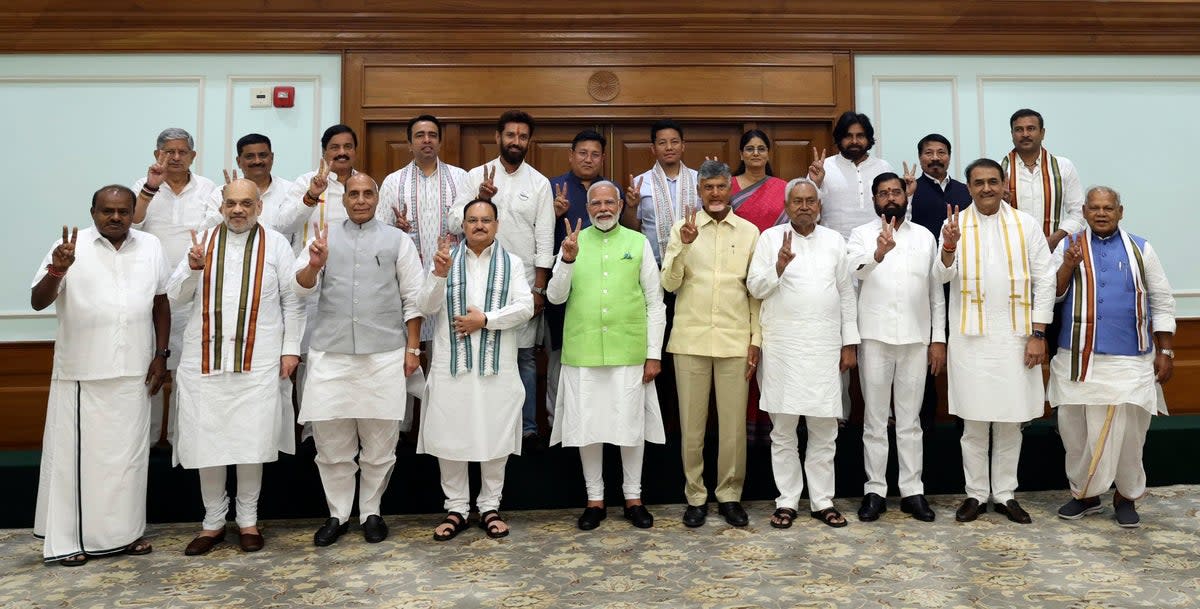Modi sets out his claim to form a new Indian government as coalition talks drag on

Narendra Modi was formally elected on Friday as the leader of the National Democratic Alliance (NDA) coalition, setting the stage for his third term as prime minister of India.
While Mr Modi’s Bharatiya Janata Party (BJP) fell well short of the majority mark of 272 seats, winning only 240 seats in its own right, the NDA coalition together won 293 seats, some 61 ahead of the opposition INDIA alliance led by the Congress party.
Mr Modi, 73, will be sworn in as prime minister on Sunday to begin a rare third term, making him only the second person, after India’s independence hero and first prime minister Jawaharlal Nehru, to win three consecutive elections.
Though Mr Modi’s Hindu nationalist BJP has governed India as part of the NDA coalition over the past decade, this is the first time under his leadership that the party has relied on support from its smaller allies to form a government.
Mr Modi tried to play down the significance of this development, which analysts say could have significant implications for his ability to pass major policies in the years to come.
“This alliance of ours reflects India’s spirit in its true sense,” Mr Modi said after the BJP and coalition members backed him as their prime-ministerial candidate. “We were neither defeated nor are we defeated ... It was an NDA government in the past, still is and will be.”
#WATCH | PM Narendra Modi meets former President Ram Nath Kovind, in Delhi
PM Modi was chosen as the leader of the NDA Parliamentary Party today. pic.twitter.com/8GI6p5lwUX— ANI (@ANI) June 7, 2024
The presidential palace, or Rashtrapati Bhavan, is expected to host up to 8,000 people for his oath-taking ceremony at 6pm on Sunday. They will include prominent figures from different walks of life, including foreign heads of state, lawyers, doctors, artists, cultural performers and social media influencers.
Official invitations have been extended to Nepal’s prime minister Pushpa Kamal Dahal, Bhutan’s King Jigme Khesar Namgyel Wangchuck, vice-president of Seychelles Ahmed Afif, and the prime minister of Mauritius, Pravind Jugnauth.
A notable invitation has also been extended to Maldives president Mohamed Muizzu, who has reportedly accepted, meaning he is set to visit India for the first time since assuming office in November last year. It comes amid strained relations between the two nations – Mr Muizzu won his election with an “India out” campaign, and has aligned his government more closely with China instead.
Bangladesh’s prime minister Sheikh Hasina and Sri Lanka’s president Ranil Wickremesinghe have also confirmed their attendance at the ceremony on Sunday.
Other special guests will include labourers involved in the Central Vista redevelopment project and rat-hole miners who assisted in rescuing 41 trapped construction workers from a tunnel in Uttarakhand last year.
Before Mr Modi was formally elected as the NDA leader, local media reported that the two key regional allies with the power to make or break his coalition government – the Telugu Desam Party in the southern state of Andhra Pradesh and Janata Dal (United) in the eastern state of Bihar – were still eyeing cabinet posts in important ministries.
The state of those talks remains unclear, and Mr Modi won’t reveal his cabinet until after his inauguration. But the leaders of the two parties reiterated their support for the alliance on Friday as they endorsed Mr Modi for his third term.
“I will be with PM Modi at all times,” said Mr Kumar, whose Janata Dal (United) secured 12 seats in the election.
#WATCH | At the NDA Parliamentary Party meeting, PM Modi says, "...People would approach you and say that they can get you a cabinet berth...Now the technology is such that a list with my signatures can come out...I urge you that all these attempts are useless...I urge all MPs to… pic.twitter.com/slco89auZI
— ANI (@ANI) June 7, 2024
“It is a very good thing that all of us have come together, and we will all work together with you [Mr Modi]. You will be swearing in as the prime minister on Sunday, but I wanted you to do it today itself. Whenever you take the oath, we will be with you... We will all work together under your leadership,” Mr Kumar said.
Mr Naidu, whose Telugu Desam Party secured 16 seats in Andhra Pradesh, also extended his support for Mr Modi. “He has a vision and a zeal, his execution is very perfect,” said Mr Naidu. “He is executing all his policies with a true spirit... Today, India is having the right leader – that is Narendra Modi.”


